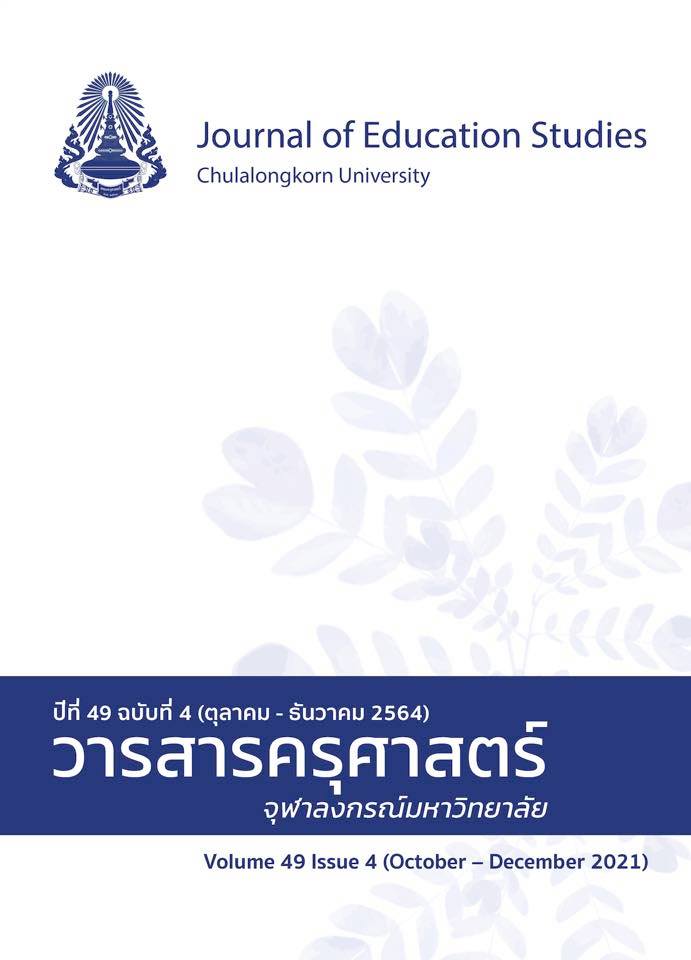The Learning Achievement and Satisfaction of Upper Secondary School Students on Learning Management of Inquiry-Based Learning (5E) with an Electronic Book
DOI:
https://doi.org/10.14456/educu.2021.64Keywords:
inquiry-based learning (5E), electronic book, learning achievement, satisfaction of studentsAbstract
The purpose of this research was to study the learning achievement and students’ satisfaction of upper secondary school on learning management of inquiry-based learning (5E) together with an electronic book. The participants of this research were 44 eleventh grade students who studied in the first semester of the academic year 2020 at an especially large school in Chonburi Province. All participants were selected by a cluster random sampling. The research instruments were 1) an electronic book on the topic of the rate of chemical reaction, 2) lesson plans on the topic of the rate of chemical reaction, 3) a learning achievement test, and 4) a student satisfaction questionnaire. The data were analyzed by using the mean, standard deviation, dependent sample t-test, and one-sample t-test. The results showed that 1) the post-test scores after learning with inquiry-based learning (5E) together with the rate of chemical reaction electronic book were higher than the pre-test scores at the .05 level of significance, 2) after learning this assigned topic with an electronic book with inquiry-based learning (5E) model, the post-test scores of the participants were higher than 80 percent at the .05 level of statistical significance, and 3) the students’ satisfaction towards this learning management and materials used were at the highest level which was very satisfied.
References
กุลิสรา จิตรชญาวณิช. (2562). การจัดการเรียนรู้. สำนักพิมพ์จุฬาลงกรณ์มหาวิทยาลัย.
กองบริหารงานวิจัยและประกันคุณภาพการศึกษา. (2560). Thailand 4.0 โมเดลขับเคลื่อนประเทศไทยสู่ความมั่งคั่ง มั่นคง
และยั่งยืน. สำนักงานพัฒนาวิทยาศาสตร์และเทคโนโลยีแห่งชาติ (สวทช.). https://waa.inter.nstda.or.th/
stks/pub/2017/20171114-draeqa-blueprint.pdf
กระทรวงศึกษาธิการ. (2560). มาตรฐานการเรียนรู้และตัวชี้วัด กลุ่มสาระการเรียนรู้คณิตศาสตร์ วิทยาศาสตร์ และสาระ
ภูมิศาสตร์ ในกลุ่มสาระการเรียนรู้สังคมศึกษา ศาสนา และวัฒนธรรม (ฉบับปรับปรุง พ.ศ. 2560) ตามหลักสูตร
แกนกลางการศึกษาขั้นพื้นฐาน พุทธศักราช 2551. โรงพิมพ์ชุมนุมสหกรณ์การเกษตรแห่งประเทศไทย.
ข่าวไทยพีบีเอส. (2562, 16 ตุลาคม). กรมสมเด็จพระเทพฯ มีพระราชดำรัส “ไม่มีเทคโนโลยีใด ๆ แทนครูได้".
https://news.thaipbs.or.th/content/285242
จินตวีร์ คล้ายสังข์. (2561). ยูบิควิตัสเทคโนโลยีที่ส่งเสริมการเรียนรู้ : การออกแบบที่เน้นผลลัพธ์การเรียนรู้สำหรับผู้เรียนใน
ศตวรรษที่ 21. คณะครุศาสตร์ จุฬาลงกรณ์มหาวิทยาลัย.
ชัยวัฒน์ สุทธิรัตน์. (2558). 80 นวัตกรรม การจัดการเรียนรู้ที่เน้นผู้เรียนเป็นสำคัญ (พิมพ์ครั้งที่ 6). พี บาลานซ์ดีไซน์
แอนปริ้นติ้ง.
ณพัฐอร บัวฉุน นฤมล ยุตาคม และพจนารถ สุวรรณรุจิ. (2559). สภาพการจัดการเรียนการสอนรายวิชาวิทยาศาสตร์
เพื่อคุณภาพชีวิต หมวดวิชาศึกษาทั่วไป. วารสารวิจัยและพัฒนาวไลยอลงกรณ์ในพระบรมราชูปถัมภ์, 11(2),
97-109.
ทิศนา แขมมณี. (2553). ศาสตร์การสอน : องค์ความรู้เพื่อการจัดกระบวนการเรียนรู้ที่มีประสิทธิภาพ (พิมพ์ครั้งที่ 13).
สำนักพิมพ์แห่งจุฬาลงกรณ์มหาวิทยาลัย.
ปานทิพย์ ผ่องอักษร และ ละเอียด แจ่มจันทร์. (2561). การใช้หนังสืออิเล็กทรอนิกส์ : ถอดบทเรียนจากผลลัพธ์การเรียนรู้ของ
นักศึกษาพยาบาล E-book implementation: Lesson learned from nursing students’ learning
outcome. วารสารพยาบาลกระทรวงสาธารณสุข Nursing Journal of the Ministry of Public Health,
28(3), 1-9.
ไพฑูรย์ สินลารัตน์. (2559). การศึกษาไทย 4.0 ปรัชญาการศึกษาเชิงสร้างสรรค์และผลิตภาพ (พิมพ์ครั้งที่ 3). โรงพิมพ์แห่ง
จุฬาลงกรณ์มหาวิทยาลัย.
วิโรจน์ สารรัตนะ. (2556). กระบวนทัศน์ใหม่ทางการศึกษา กรณีทัศนะต่อการศึกษาศตวรรษที่ 21. ทิพยวิสุทธิ์.
สถาบันส่งเสริมการสอนวิทยาศาสตร์และเทคโนโลยี. (2561). คู่มือการใช้หลักสูตรรายวิชาเพิ่มเติมวิทยาศาสตร์ วิชาเคมี
ระดับมัธยมศึกษาตอนปลาย กลุ่มสาระการเรียนรู้วิทยาศาสตร์ (ฉบับปรับปรุง พ.ศ. 2560) ตามหลักสูตร
แกนกลางการศึกษาขั้นพื้นฐาน พุทธศักราช 2551. สำนักพิมพ์แห่งจุฬาลงกรณ์มหาวิทยาลัย.
สถาบันการศึกษาแห่งชาติ. (2562). สรุปผลการทดสอบทางการศึกษาระดับชาติขั้นพื้นฐาน ระดับชั้นมัธยมศึกษาปีที่ 6
ปีการศึกษา 2562. http://www.newonetresult.niets.or.th/AnnouncementWeb/PDF/
SummaryONETM6_2562.pdf
สุวัฒก์ นิยมค้า. (2531). ทฤษฎีและทางปฏิบัติในการสอนวิทยาศาสตร์แบบสืบเสาะหาความรู้ เล่ม 2. เจเนอรัลบุ๊คส์ เซ็นเตอร์.
The standard. (2562, 4 ธันวาคม). ผลประเมิน PISA 2018 : คะแนนนักเรียนไทยอยู่จุดไหนในเวทีนานาชาติ.
https://thestandard.co/pisa-2018-2
Downloads
Published
How to Cite
Issue
Section
License

This work is licensed under a Creative Commons Attribution-NonCommercial-NoDerivatives 4.0 International License.




